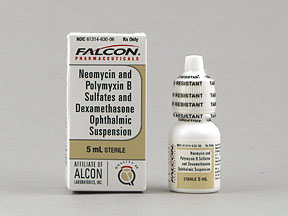
Neomycin-polymyxin-dexameth Coupons & Savings Card – Discount Prices from $13.48
Generic for: Maxitrol
My prescription
Edit
5ML of 3.5-10000-0.1, Neomycin-polymyxin-dexameth (1 Bottle)
Select pharmacy

CVS
$21.36
COUPON PRICE
Walmart
$13.48
COUPON PRICE
Albertsons
$15.59
COUPON PRICE
Walgreens
$16.28
COUPON PRICENeomycin-polymyxin-dexameth savings card
Show this card to your pharmacist
Walmart
$13.48
BIN
ID
PCN
GRP
019876
LH7C68D883
CHIPPO
LHX
Powered by
More prescriptions for eye inflammation
More prescriptions for eye inflammation
Price history for Maxitrol (brand) & Neomycin-polymyxin-dexameth (generic)
1 Bottle, 5ML of 3.5-10000-0.1nan
Average retail price for Maxitrol
Average retail price for Neomycin-polymyxin-dexameth
Average SaveHealth price for Neomycin-polymyxin-dexameth
Our price history data is based on aggregated prescription data collected from participating pharmacies in America. Our prescription data updates daily to reflect the latest price changes. If you notice a missing data point, it means there wasn't sufficient data available to generate a monetary value for that date.
We analyzed Neomycin-polymyxin-dexameth prices for (5ML of 3.5-10000-0.1nan, 1 Bottle) over the last 12 months. The average retail price was $32.76, while the average price using the SaveHealth discount card was $15.95. That's a savings of approximately 51.31% when using our Neomycin-polymyxin-dexameth coupon.
Compared to the generic version, Maxitrol had an average price of $138.72 over the same time period. With the SaveHealth savings card, Neomycin-polymyxin-dexameth is 88.50% cheaper on average than Maxitrol.
*Retail prices are based on pharmacy claims data, and may not be accurate when we don't have enough claims.
Neomycin-polymyxin-dexameth dosage forms
Dosage Quantity Price from Per unit 5ML of 3.5-10000-0.1nan 1 Bottle $13.48 $13.48 5ML of 0.1% 1 Bottle $18.35 $18.35 5ML of 0.1% 2 Bottles $32.29 $16.14 5ML of 0.1% 3 Bottles $35.47 $11.82 5ML of 3.5-10000-0.1nan 2 Bottles $24.42 $12.21 5ML of 3.5-10000-0.1nan 3 Bottles $35.47 $11.82
| Dosage | Quantity | Price from | Per unit |
|---|---|---|---|
| 5ML of 3.5-10000-0.1nan | 1 Bottle | $13.48 | $13.48 |
| 5ML of 0.1% | 1 Bottle | $18.35 | $18.35 |
| 5ML of 0.1% | 2 Bottles | $32.29 | $16.14 |
| 5ML of 0.1% | 3 Bottles | $35.47 | $11.82 |
| 5ML of 3.5-10000-0.1nan | 2 Bottles | $24.42 | $12.21 |
| 5ML of 3.5-10000-0.1nan | 3 Bottles | $35.47 | $11.82 |
